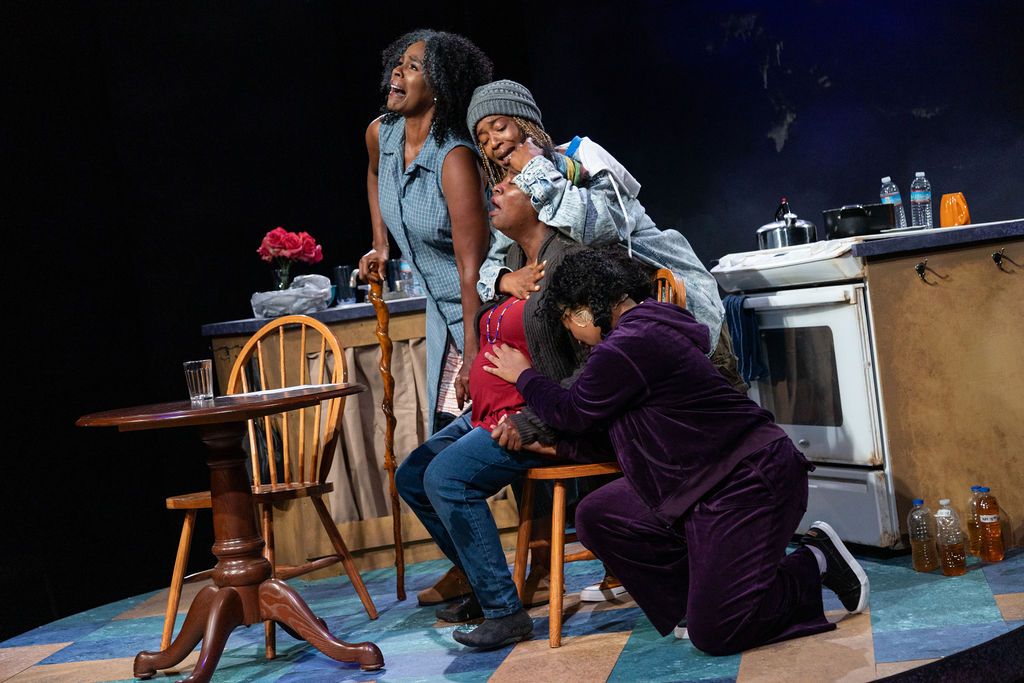The ongoing crisis in Flint, Michigan, where the drinking water of the city was contaminated with lead after government officials switched its source from Lake Huron to Flint River, haunts three generations of Black women in playwright Erika Dickerson-Despenza’s Cullud Wattah, opening today at Actor’s Express and on stage through October 15.
The Cooper family home creaks and its pipes moan and drip, letting the play’s audience know of the persistent threat that surrounds the characters and keeps them sick. Rashes spread across their bodies. One character has a continuous menstrual period. A child is living with leukemia. Yet the women persist, providing care, laughter and love to one another. But they have different means of coping with the threat and corrosive secrets they keep from one another.
“All of these women are moving through the crisis in their own special way, while trying to connect and bond as family members,” said director Amanda Washington. “We go up against the truth, in the sense of when to tell somebody if you’re holding a secret. If you were keeping a secret from them, was it for their own good?”
The layers and the urgency of that drama compelled Washington to push for Artistic Director Freddie Ashley to secure the play, which concludes the 35th season of Actor’s Express.
“When I read it, I felt that I knew all of these women,” Washington said. “Pieces of them live inside me. I’ve grown up around them. I was pulled to the piece, and it’s about things that are happening right now.”
She discovered the script on the Kilroy’s List, which promotes the work of female and trans playwrights in an attempt to achieve gender parity in American theater.
“It’s not just bleak,” Washington said. “I think what makes a really good, intense and dramatic play, a really gut-wrenching play, is the fact that it puts you at ease that you may just get a happy ending.”

There are moments of joy and levity as the family connects. Washington said the play is heartwarming, for it will provide some audiences with a walk down memory lane.
“I find it so fascinating that this play can pack so much into about 110 pages,” Washington said. “We’re exploring Christianity and Gullah culture. A couple of the characters are part of the queer community. We’re looking at General Motors and their participation within the Flint water crisis. We’re also dealing with sickness, how life moves through it and what comes after if there’s an after. There isn’t always.”
Actress Parris Sarter portrays Ainee, a character seeking justice and restitution for what was done to the residents of Flint.
“My biggest challenge has been not allowing my character to sit in sadness,” she said in a message. “This is a heavy play, but there are pockets of joy and hope sprinkled throughout it. Even when I suffer my personal loss, I’m still able to hold on to some hope.”
Hope is a discipline, Sarter said.
“That’s been our mantra throughout this process,” she said. “During our rehearsals, we actors have found hilarity and joy with ourselves to balance out the heavy content.”
The ensemble includes Morgan Crumbly, Marita McKee, Asha Basha Duniani and Terry Henry.
Sarter said Ainee has to live for the future.
“Even if Ainee has to go through murk and dirty water, she knows that her future is better than her family’s current situation.”
According to Washington, the play uses surrealist elements in the script and in its design. In some ways, it takes place in the past, the ongoing present and the future, she said.
In addition to Mikeala Fraser’s sound design using the noise of the pipes, the set design from Bailey McClure Frank incorporates circles everywhere within the Cooper household, showing how some of the characters are stuck in the same cycles and methods. But some of the women may break free.

“Do these characters ever break out of what they’re fighting against or what they’re going through?” Washington said. “That’s a strong question we see at the beginning of the show, and it’s somewhat answered by the end of the show, in my opinion.”
It will resonate with the audience in powerful ways, she predicted.
“This is a powerful play in that the writing doesn’t pull any punches or hold any punches back,” Washington said. “It is in your face, making you feel things and making you question, like ‘Maybe I need to ask where my own water is coming from.’”
::
Benjamin Carr, a member of the American Theatre Critics Association, is an arts journalist and critic who has contributed to ArtsATL since 2019. His plays have been produced at the Vineyard Theatre in Manhattan, as part of the Samuel French Off-Off Broadway Short Play Festival and at the Center for Puppetry Arts. His novel, Impacted, was published by The Story Plant in 2021.

